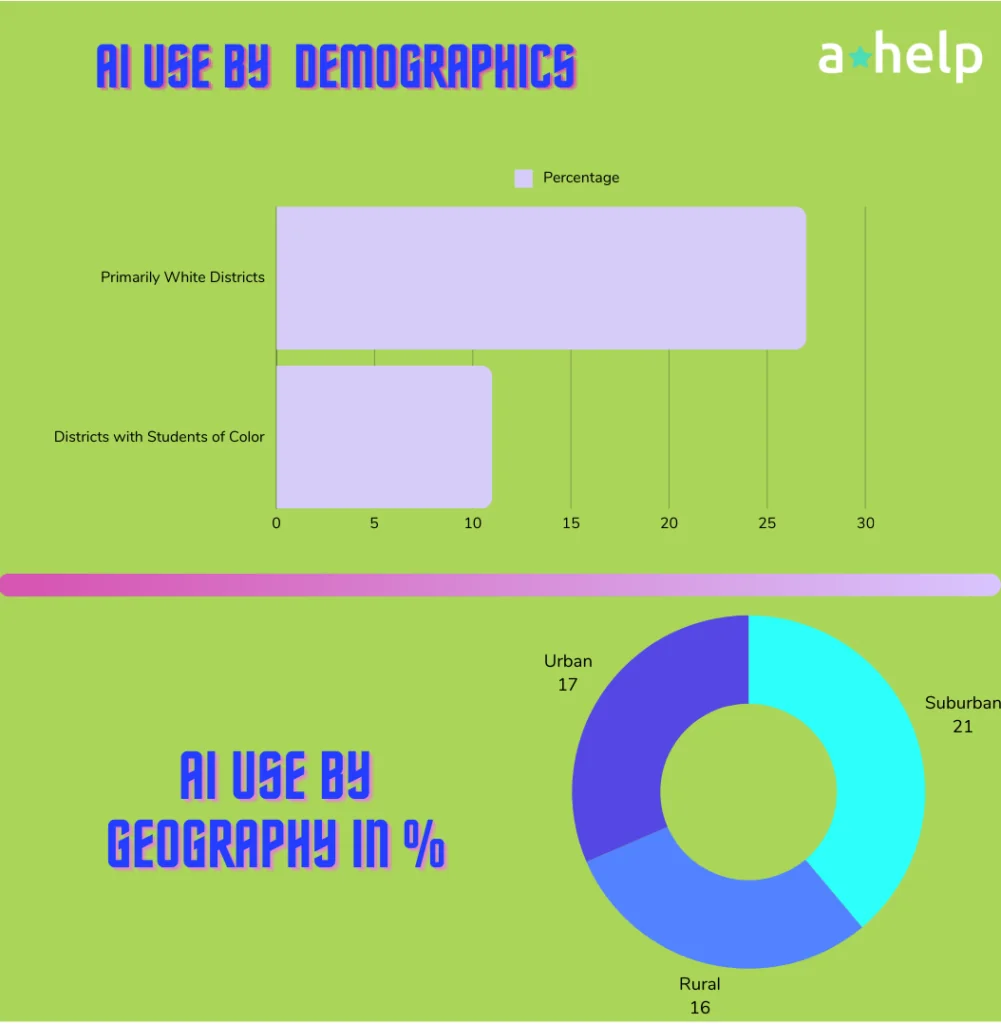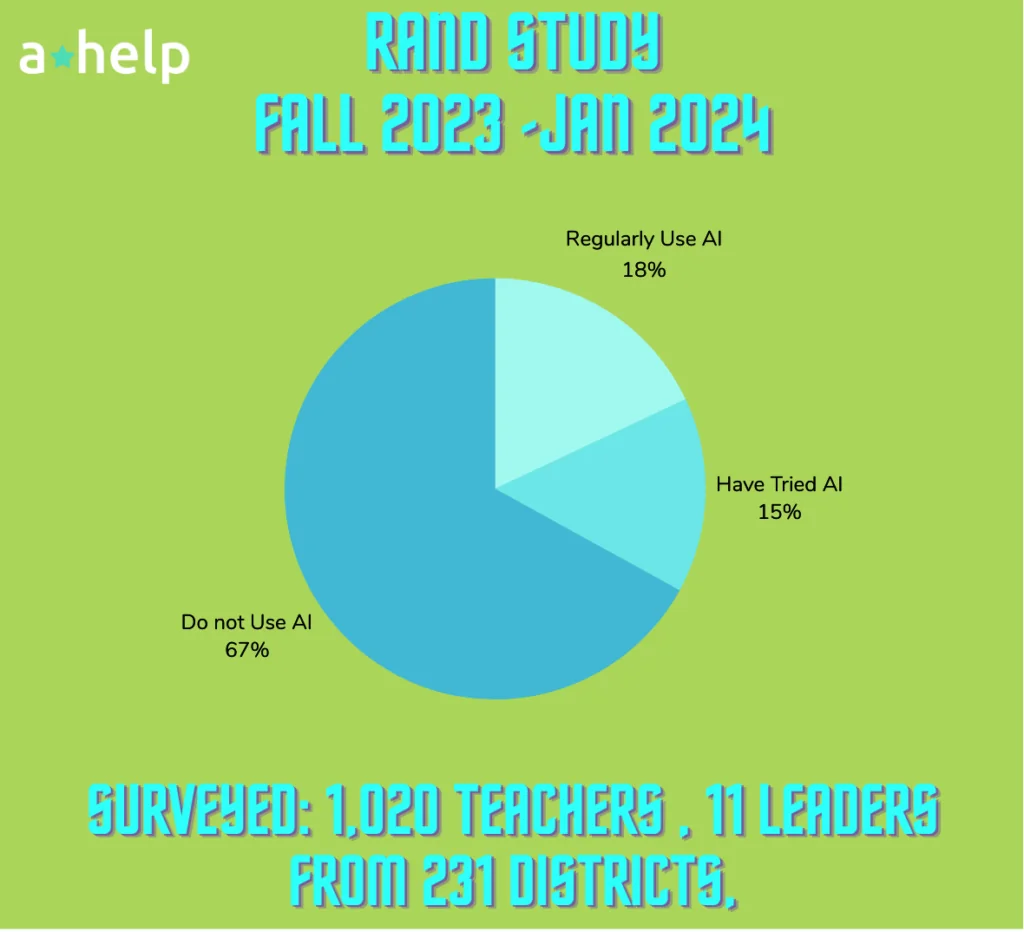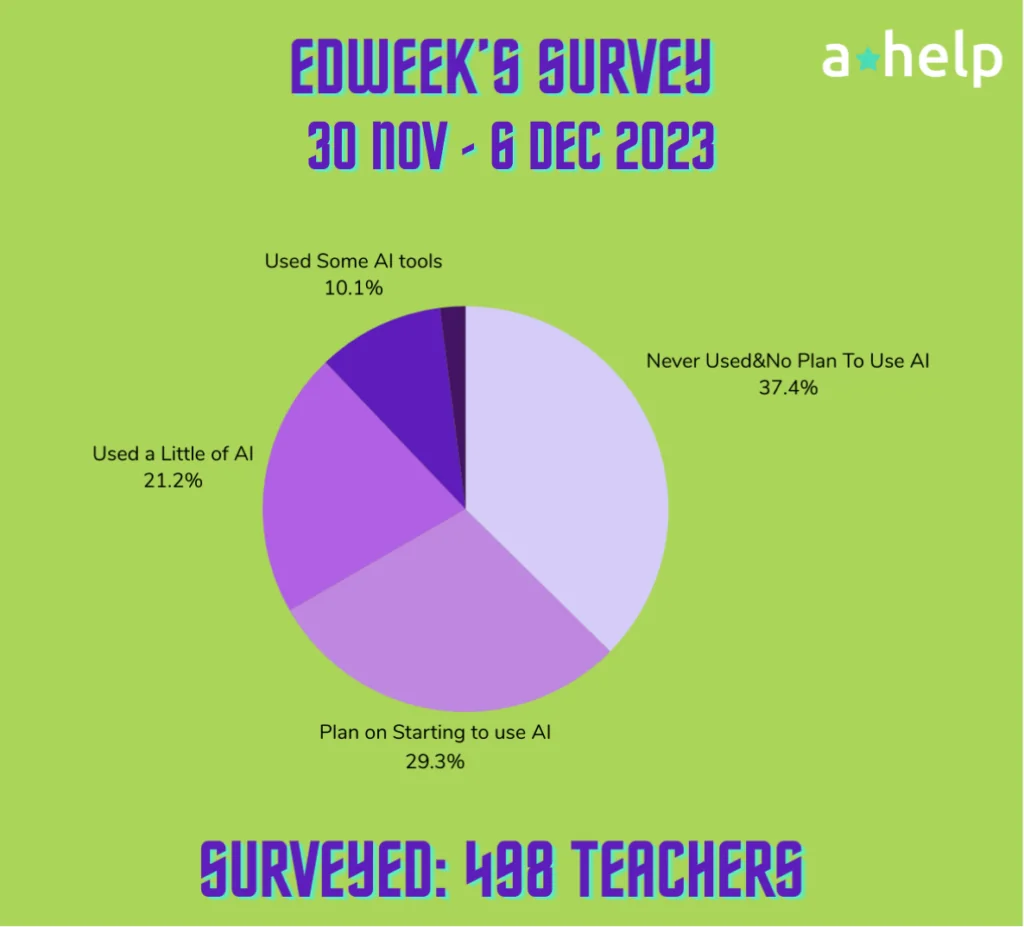Even after 1.5 years of AI revolution that started with the appearance of ChatGPT, teachers seem hesitant to adopt new technologies in their practice. Yet, some educators are more open to new experiences than others, as shown by the recently posted RAND study and EdWeek’s research. It appears that, despite widespread hesitation among academic representatives, English and Social Studies teachers are leading the charge in integrating AI tools into classrooms.

✅ AI Essay Writer ✅ AI Detector ✅ Plagchecker ✅ Paraphraser
✅ Summarizer ✅ Citation Generator
Key Takeaways
- Despite an overall slow adoption rate of AI in education, English and Social Studies teachers are at the forefront.
- There is a notable disparity in AI training provided to teachers in districts serving predominantly white students versus those serving students of color, pointing to an underlying equity issue in educational technology.
- Teachers, particularly in higher poverty schools, are using AI to generate instructional materials out of necessity due to a lack of resources, which shows a gap in quality educational materials and points toward a need for careful review of AI-generated content so that it meets academic standards.
Specifically, the study by RAND states, that only 18 percent of teachers report regular use of AI-powered tools in their teaching routines, with an additional 15 percent experimenting with these technologies sporadically. This cautious engagement reflects a broader trend of reluctance, as two-thirds of educators have yet to incorporate AI into their classrooms.
These findings were also supported by the Edweek Research Center’s recent survey. There. they indicate a similar pattern of hesitancy, with two-thirds of teachers also reporting no current use of AI tools. However, there was a flicker of change on the horizon, with 29 percent of respondents expressing intentions to embrace AI technologies in the near future, suggesting a potential shift in this landscape.
The relatively higher adoption rates among English and Social Studies teachers were specifically interesting. As noted by Sy Doan, a policy researcher at RAND and one of the authors of the report,
“27 percent of English teachers and social studies teachers are utilizing AI tools, notably higher than their counterparts in other disciplines.”
This trend may stem from these educators‘ need to create and supplement their own instructional materials, which is lee in other fields, especially science-related ones. Doan also speculates that many educators across disciplines might already be using AI without realizing it, citing common platforms like Google Classrooms and Khan Academy that subtly integrate AI features.
“There could be existing tools for STEM teachers out there that already have AI embedded in them, but teachers may not be aware that what they’re using is powered by AI.”
There was also a division in AI tool usage between different educational levels. Middle and high school teachers were more likely to incorporate AI regularly than their elementary school counterparts, who often viewed these tools as unsuitable for younger students. This sentiment was vivid in the open-ended responses of the RAND survey, where several elementary school teachers expressed concerns about the appropriateness of AI tools for younger age groups.
Do The Income, Geography, and Demographics Matter?
There’s no need to hide that many believe the usage of AI tools depends on whether the schools adopting them are high or low-income ones. Yet, the RAND study presents a narrative that defies expectations, as no stark contrast based on school income levels or teachers’ years of experience was found.
However, the utilization of AI tools did vary by geography and demographics. Districts with a majority of white students reported more proactive measures in equipping educators with AI training—27 percent, in sharp contrast with the 11 percent in districts primarily serving students of color. Similarly, a slight advantage is seen in suburban areas, where 21 percent of teachers incorporate AI compared to their rural and urban counterparts, at 16 and 17 percent respectively.

AI Tools That Admittedly Reshape Educational Landscape
Virtual learning environments such as Google Classroom, adaptive learning technologies like Khan Academy, and innovative chatbots including ChatGPT and Google’s Gemini are leading the AI charge in educational tools. These platforms were reported to empower teachers the most as they help tailor educational content for diverse student needs and easily create custom materials.
Sy Doan from RAND noted another nuanced layer in AI tool incorporation into day-to-day study life:
“About 41 percent of teachers using AI leverage it to craft quizzes, assignments, and worksheets. Interestingly, this practice is particularly prevalent among teachers in higher poverty schools.”
This reflects a broader trend wherein teachers in under-resourced schools tend to constantly seek out new solutions to compensate for little materials. These educators are increasingly turning to AI, like ChatGPT, to fill these gaps. Doan adds,
“Our take on that is that it’s not necessarily a bad thing, but a lot of these outputs are unverified and there is no way to tell whether or not they are aligned to academic standards or have any of the qualities we would associate with high-quality instructional materials.”
He suggests that ensuring the quality of AI-produced materials should be a new focus area for educational leadership.
The Key Point
Resistance to AI adoption remains, fueled by concerns over its societal implications, data privacy issues, and a perceived lack of support and professional development. These challenges are shared by both current and prospective AI users, signaling a need for strategic leadership in navigating the AI terrain in education.
Follow us on Reddit for more insights and updates.







Comments (0)
Welcome to A*Help comments!
We’re all about debate and discussion at A*Help.
We value the diverse opinions of users, so you may find points of view that you don’t agree with. And that’s cool. However, there are certain things we’re not OK with: attempts to manipulate our data in any way, for example, or the posting of discriminative, offensive, hateful, or disparaging material.